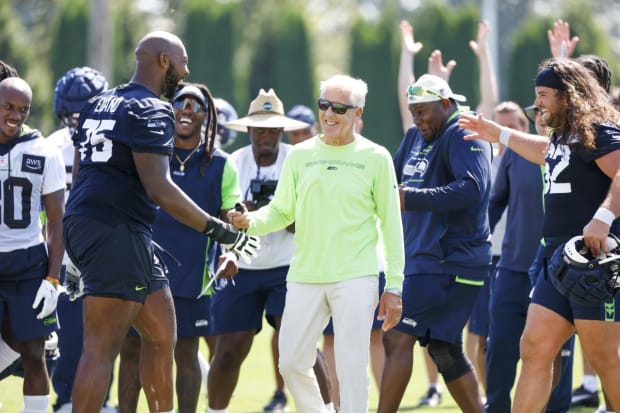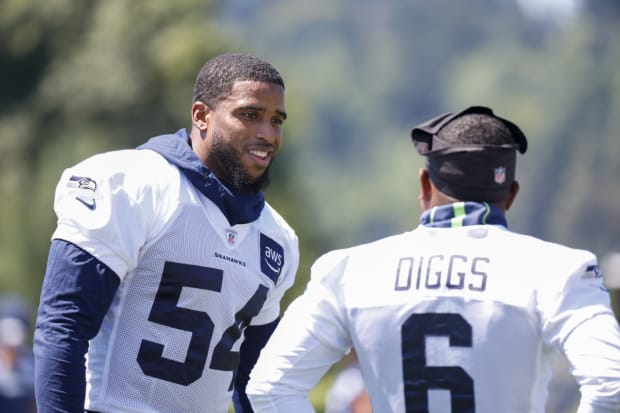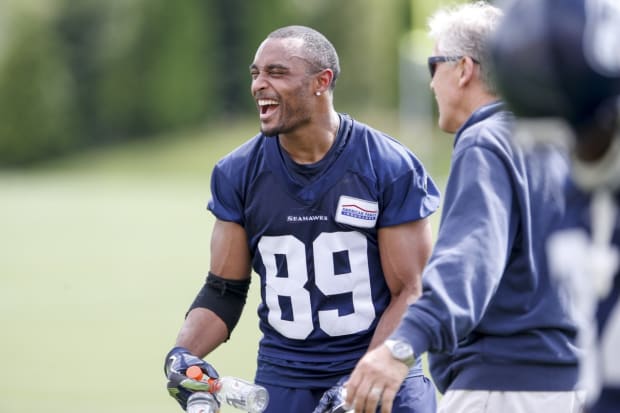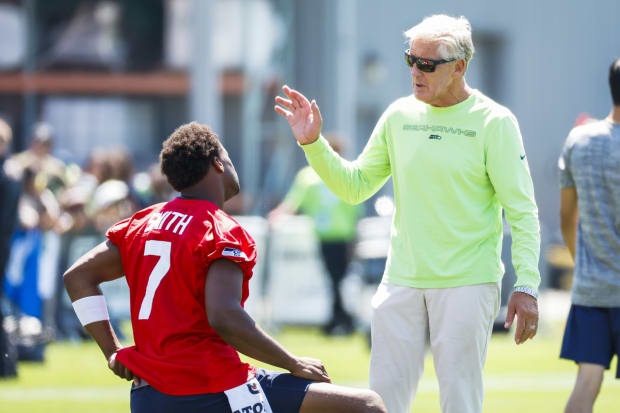It was June, the Seahawks were in minicamp, and everyone, not just here but across the league, was still about a month and a half away from the summer’s first padded practice.
Not that you would’ve known that if you pulled up to Seattle’s Renton, Wash., practice field.
“We were jaw-jacking, talking smack to each other. It’s minicamp, OTAs, and you can’t tell that,” recounted quarterback Geno Smith. “Guys are competing, like really competing. It’s really just the culture of the locker room. It’s what we do. I always go to the weight room at 6 a.m. no matter what I do, and I’ve got guys literally trying to beat me to the weight room. There are guys in there at 5:30, 5:40. I’m just like, Come on, guys.

Joe Nicholson/USA TODAY Sports
“That’s how deep the competition is. Yeah, we’re a team, but who wants to be an alpha dog on the team? You’ve got Bobby Wagner, DK Metcalf, Tyler Lockett, myself, Jarran Reed, so many alphas. … It’s crazy, the night before I’m like, I need to get some sleep early, like 8:30, 9, because if I don’t get up at 5 a.m. and get out of my house at 5:15, somebody else is going to beat me to the weight room. That’s just the culture of our team at this point.”
Meet the new Seahawks, same as the old Seahawks. The same, they hope, in every way.
Part of the legend of the Legion of Boom Seattle teams was how the program was so competitive that the practices—with the roster’s edgiest players going head-to-head—were tighter, nastier and livelier than most games. True or not, the idea typified the energy of the operation, and what Smith is describing in this case is, well, at least in that ballpark.
The roster may be heading that way, too. While they aren’t there yet, the 2022 draft class has the makings of Pete Carroll and John Schneider’s early draft classes—Seattle shored up weaknesses at tackle and corner with two players at each spot, landed a bell-cow tailback and an edge rusher compared now to Cliff Avril. And the ’23 group, buoyed like ’22 with extra first- and second-rounders from the Russell Wilson deal, might not be far behind.
In the eye of this storm is the 71-year-old Carroll, one of just three coaches (Jimmy Johnson and Barry Switzer the others) to win a Super Bowl and a college national title. With all that experience and wisdom, it’d be understandable if he wanted to slow down the idea that this group is comparable to the historic one that roamed these halls a decade ago. But instead of tapping the brakes, he’s punching the gas, in particular, because he sees a trait this group has that the previous one thrived on.
“Just a huge frickin’ chip on their shoulder,” Carroll says. “The [old Seahawks] had to prove it. It didn’t matter who it was or where it was. They just had to prove it and get the f--- out of the way; we’re coming through. I really think [this group has that]. We’ll find out. We’re working through it. We got to face the challenges that are coming here and see how we respond and see what emerges from it. I’m opening the door for them. It’s wide open.
“We’ll cut them loose.”

Joe Nicholson/USA TODAY Sports
What excites Carroll about what’s in front of him, and his team, gives Bobby Wagner just a little pause.
The 12-year vet returned to Seattle in the offseason, after a year with the Rams, and is bringing back institutional knowledge no one else in the organization can—he’s the one guy who was in the locker room with those powerhouse teams that’s left. So when he hears the rookies and sophomores on hand compared to the franchise-altering draft classes of 2010, ’11 and ’12, he’s more than happy to add some context to the conversation.
“I was that young guy, so I’m kind of looking at it through a different lens,” says Wagner, who arrived as a second-rounder in 2012. “A lot of people try to compare, but they’ve been trying to replace that group since 2012. There was a group that came in that had potential in 2015, and they labeled them Legion of Boom 2.0. They didn’t amount to that. For me, I don’t try to put that pressure on the young guys that they have to live up to that.
“It’s just, be themselves. Obviously, the draft class last year did a really good job and hopefully this draft class is the same. We added some good pieces around them. That’s all we can hope for.”
Indeed, the 2015 class got off to a nice start and even has three players still in the league—Tyler Lockett, Broncos defensive end Frank Clark and Giants offensive lineman Mark Glowinski. What it didn’t have was the depth and immediate production that the ’22 class did. And the numbers most certainly bear that out.
Collectively, Seahawks rookies played 4,838 snaps last year, second in the league to the Texans, and made 70 starts, also second to Houston (and the 11th-highest number since 2011). On offense, the draft class accounted for a league-high 22.9% of the snaps played, numbers usually reserved for teams that are rebuilding, not those that wind up in the playoffs.
“I kind of knew coming out of training camp,” Smith says. “One example was [Tariq] Woolen was just giving us problems. I’m like, Who is this guy? I really hadn’t studied him. He’d only played one year of corner in college. In my mind, I’m like, it might be a tough season for us on offense. Going into the season and seeing him do what he did, it resonated with me that he was the real deal in camp.
“With the tackles, I knew. The first game, I really knew they were ready. Just from minicamp, OTAs, they came in with the work demeanor. They knew what they had to do. There weren’t missed assignments. They were pro’s pros already. They kept their heads down. They kept working. I knew with the tackles they were going to be good. You can tell with Ken Walker. You put the ball in his hands; he’s special.”
And after Walker, Woolen and those tackles, Charles Cross and Abe Lucas, Smith dived into corner Coby Bryant and defensive end Boye Mafe and even undrafted safety Joey Blount, and you get the idea. It’s a lot of guys with a lot of potential, most of whom are at premium positions, that have played a lot of snaps.
That, alone, gives Carroll and Schneider a nice baseline to take another step forward. Then, add that to how the coach feels about this year’s crop and last year’s class, and you’re really cooking with gas.
“It’s different,” Carroll says. “This year, it’s more obvious. Jaxon [Smith-Njigba], it’s so clear what he can do. And what Spoon [Devon Witherspoon] is doing? The tackles were hard. It took a long time to figure that out. It took half a season. Took a long time. [These guys], they’re ready to go.”

Joe Nicholson/USA TODAY Sports
At the end of the offseason program in June, Carroll brought in Doug Baldwin, who arrived in Seattle in 2011 and played all eight of his NFL seasons for the Seahawks, to address his team as a whole.
Baldwin’s speech centered on the standard that was set in that building as Russell Okung, Earl Thomas and Kam Chancellor arrived in 2010; K.J. Wright, Richard Sherman and Malcolm Smith were drafted in ’11; and Wagner, Bruce Irvin and Wilson got there in ’12; with vets such as Avril and Michael Bennett added along the way. Baldwin would say as the roster improved, the competition amped up, and a brotherhood formed.
By some in the room, it was taken as Baldwin subtly passing the baton to these young classes coming in. And he isn’t the only one doing that.
“Sherm was here two days ago. Kam was here two days ago. Doug and Jermaine Kearse were here. They were just around,” Carroll says. “Those guys are the real deal. It rubs off. Our guys get a sense of it and take it their own way—I don’t want to be like them. I want to be better than them. I want to be more than them if we’re so lucky. We’ll find out. It’s going to take a while. It’s going to take some success, too. They’re going to have to do well. They’re going to have to feel it. It’s not something you can paste on guys.
“It’s out there for them. They know that we’ve introduced them to the standard of operating. They have to embrace it. They have to take it over. … Doug, he was an amazing part of that thing. He talked about the standard and introduced it to them. I can talk about it all I want; they have to embrace it. They have to own it.”
Still, it’s not a stretch to say the rookies are taking the baton, with the second-year guys already in full stride running with it.
The opportunity to match that class will be there, too. There are roles—in the slot on opposite sides of the ball—there for the taking for first-rounders Witherspoon and Smith-Njigba. Derick Hall’s impressed already with his strength and toughness, and plays a position, defensive end, at which Carroll loves to rotate. There are carries available for Zach Charbonnet and even Kenny McIntosh alongside Walker. Smith mentioned fifth-round center Olu Oluwatimi as another guy who is plug and play.
“You can’t tell some of these guys are rookies,” the quarterback says. “You can tell they’ve played a lot of big-time football, and you can tell they were drafted for a specific reason to fit specific roles. It’s like puzzle pieces. They just fit right in, like a puzzle.”
And Smith says that’s not just because a lot of them played in a lot of big-time spots in college. It’s also because they fit into what’s been built in Seattle, which today has a lot of the same distinguishing features that it did 13 years ago when Carroll and Schneider arrived to perform a total teardown and rebuild.
“Just watch almost any time Spoon gets near anything, any time Hall gets near anything—somebody’s going down, getting knocked out of the way, a play’s going to be made, the ball’s going to be flying,” Carroll says. “That’s just how they are. Adding that to Bobby’s leadership and with Quandre [Diggs’s] leadership, the style of play that [Darrell] Taylor brings for us, he’s a very energetic, very emotional guy. I like walking that fine line. I have no problem with that at all. Hopefully, we can battle with whatever that brings. I don’t mind that one bit.”
Fair to say, if the results follow, the rest of Seattle won’t, either.

Joe Nicholson/USA TODAY Sports
Smith glows when he talks about the atmosphere here, and it wasn’t just a result of last year’s personal breakthrough and all the wins that followed.
There’s a reason why he signed a one-year deal in four consecutive years to stay in Seattle without any promise of playing a single snap, then did a three-year contract in March to stay as the team’s starter. And a big part of it goes back to his first team meeting in 2019 after single-season stints with the Giants and Chargers followed his ’17 departure from the Jets.
“I come here to the first meeting, and guys are standing around shooting hoops, guys have their phones out. Coach comes in, and he’s rowdy, getting guys fired up out of their seats,” Smith says. “It’s almost like a parade. I’m sitting there, looking around like, Is this some type of a joke? What’s going on? Is it a special day? Is it someone’s birthday? What’s going on? It’s just how they do things. This is the energy. It’s infectious. The energy he brings every day, it’s just infectious. That first meeting for me was a ‘wow’ moment.
“I was taken aback because I was like, This can’t be real in the NFL. It feels like high school.”
It didn’t take long for Smith to be sold.
“John Schneider and Coach Carroll, they’re some of the most special leaders I’ve ever been around,” Smith says. “Not many organizations are built on positivity, as you know, in the NFL. It’s all different styles of coaching, different styles of getting players better. I think here, it’s the optimism that Coach Carroll brings to the table. … [Getting here] was one of the most eye-opening experiences I’ve had in my life. It changed me. It showed me that positivity does work. You don’t have to be super hard on yourself.”
Then, Smith raised two examples to illustrate the point.
The first came from 2021, when Carroll was able to keep his team level and on board after Wilson went down—something the coach accomplished by simply staying consistent and trusting in the program he built over the previous decade in Seattle.
The second comes every Friday, when Carroll is out there running sprints with his players. Carroll turns 72 on Sept. 15. So his energy, in so many ways, becomes their energy, the way it did when Carroll was doing the same with the Legion of Boom guys in his early 60s.
“To be honest, I don’t want to go anywhere else, because I’m afraid of going back to what it used to be,” Smith says. “A lot of players here say that.”
And Carroll’s mood right now reflects that. He knows what he’s got—a grip of high-end young players to build around, some steady vets worked in, a playoff appearance to build upon and a program that, once again, seems to be embodied by his players just as much as it is by him. There’s a reason for all that, of course.
The Seahawks should be really good, and Carroll’s not running from that.
He’s running toward it.
“This is as much fun as I can ever remember having,” he says. “Every morning I can’t wait to get going—every day. It’s these guys and the way they are and the future that’s there for us, and it’s the chance of making it. Whatever that brings, I don’t know, but it’s a frickin’ blast right now. I can’t wait to see what happens the next day, see if we can stir them up again, get them riled up again, get them more juiced up. Defense kicked ass two days ago out here, and offense bounced back a little bit today …
“It’s the challenge to discover who you are and what you’re all about and how far you can take it that just makes your heart pump. Looking forward to it every day. Can’t wait for tomorrow night, can’t wait to get out there in the stupid little game in the stadium.”
Carroll, there, was referencing an intrasquad scrimmage scheduled the next night at Lumen Field, but the broader point he was making was the more important one. And that excitement? It was written all over his face, as his voice kept quickening as if it were trying to keep up with his mind racing.
I mentioned the smile he couldn’t seem to shake talking about his team.
“I’m just jacked,” he says. “I really am. I can’t tell you anything different. It felt like that last spring. We had enough stuff, enough guys, and then we drafted again.”
And if this doesn’t seem like a septuagenarian with a plan to retire in the next couple of years, well, then you’re paying attention. Because based on the way Carroll feels, with the team he has, there’s no need for any sort of exit strategy now.
“I don’t know, I don’t give a s--- about any of that,” Carroll says, grinning. “They’re going to have to work really hard to run me out of here right now. I’m having too much fun.”
Which is just another thing in this place that’s starting to feel awfully familiar.







